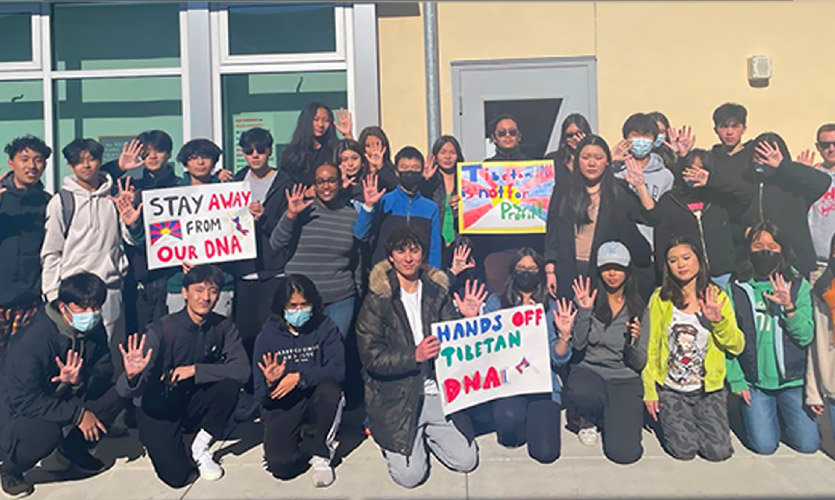Two California counties saw Tibetan students protesting against a US company on Monday, for “selling” DNA kits to the police in Tibet, to allegedly keep an eye on Tibetans and abuse human rights.
Thermo Fisher Scientific Inc faced protests in Contra Costa and Alameda counties under the banner “Hands Off Tibetan DNA”. Protesters alleged that the products of the company contributed to the abuse of Tibetans by the Chinese government.
A company such as this is not new to the dystopian programs of mass surveillance and repression of the Chinese government. There have been complaints in the past about Thermo Fisher selling DNA-testing equipment to police in Xinjiang province.
Chinese DNA collection is rampant in Tibet, according to a report released by Human Rights Watch on September 5, 2022. The report noted that drives were scheduled to occur in 14 different places (one prefecture, two counties, two cities, two townships, and seven villages) across seven prefecture-level regions. Chinese police in Tibet apparently requested bids from companies to build a regional-level DNA database in July 2019, according to government procurement papers, which was another sign that officials were getting ready for a collecting drive across the area. Police in Tibet’s Nyingtri announced the creation of a local DNA database in November 2019. Children as young as five years are reportedly included in the DNA collection drive in Tibet, which violates basic norms of informed and free consent.
It has been estimated that Chinese authorities have collected between 9,19,282 and 1,206,962 DNA samples in Tibetan areas, referred to by the Chinese government as the Tibet Autonomous Region (TAR) since 2016, according to a report published in the same month by Citizen Lab at the University of Toronto. According to the report, Chinese officers collected “pin-prick blood samples” from Tibetans in fields, monasteries, residential neighbourhoods, businesses, and even schools.
With the assistance of important Western industrial partners, the Chinese government is constructing the world’s largest police-run DNA database. Thermo Fisher Scientific, situated in Massachusetts, is one such partner. In Tibet, it is a major supplier of DNA profiling technology. In December 2022, Congressional-Executive Commission on China (CECC) commissioners and Tibetans requested answers from the US corporation, concerning the supply chain connected to China’s bulk collection of DNA in Tibet, and the participation of its goods in human rights violations in the region.
On December 15, 2022, the bicameral and bipartisan CECC sent a letter to Marc Casper, chairman and CEO of Thermo Fisher Scientific, expressing concern about the use of his company’s products for mass DNA collection in Tibet, which “could enable further gross violations” of ethnic minorities’ human rights in China.
Senator Jeff Merkley (D-OR) and Representative Jim McGovern (D-MA), chair and co-chair of the CECC, respectively, signed the letter, as did Senator Marco Rubio (R-FL) and Representative Chris Smith (R-NJ), ranking members of the commission.
Thermo Fisher is being pressed to respond to the question regarding whether its products involve the mass collection of Tibetan DNA, by organisations like Students for a Free Tibet, Free Tibet, the International Tibet Network, the Tibetan Association of Boston, and other Tibetan activists and supporters.
“Since October, Tibet groups have contacted the company on multiple occasions, requesting a meeting with Thermo Fisher CEO Marc Casper and for detailed responses to questions about the company’s knowledge of equipment sales to police in occupied Tibet and what steps the company has taken to prevent misuse of its products,” stated the organisations.
The DNA collecting programme has been promoted by Chinese officials as a way to help them solve crimes (such as bank robbery or kidnapping). According to the Tibet Rights organisation, however, this is a classic instance of an authoritarian, imperialist state developing new ways to oppress people under the guise of “stability maintenance and social control”.
It is said that the purpose of collecting DNA is to improve the effectiveness of verification and assist in the capture of fugitives. Similar explanations of the need for DNA collection for general crime detection were given to locals in various parts of the region. Mass collection is required for public security agencies to discover different unlawful instances, and to efficiently clamp down on illegal and criminal elements, as one government report put it.
Since the beginning of 2010, police in other parts of China have also conducted extensive DNA collecting. However, the evidence that is currently available suggests that these efforts have been restricted either to segments of the population that the police view as problematic such as immigrants, ex-offenders, criminal suspects, and other social groups labelled as “focus personnel”, or since 2017, to a police programme across China that has been collecting the DNA of an estimated 8.1 to 26.4 percent of all males in the nation.
Read more: Is Myanmar’s Military Junta Losing Favour With Beijing?










